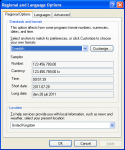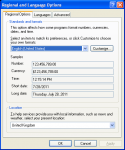Gopher2011
Well-known member
Hi -I have found two threads below but they do not do exactly what I need, so I decided to post in here.
http://www.vbdotnetforums.com/vb-net-general-discussion/46944-change-format-date-day-week.html
http://www.vbdotnetforums.com/vb-net-general-discussion/3615-datetime-problems-resolved.html
I am trying to read the pc system information so that I can retrieve the time and date format.
My code below:
Retruns in debug: "dddd, MMMM dd, yyyy"
So I have 2 questions;
1) Why is there, a dd after the MMMM.
2) My company has small franchise branch offices round the world - France, USA, etc
What I am trying to do is get the date format so I can decide what country I am in - then when I print out the date on my order labels I can change the date format to suit Americans or Europeans etc.
Does anyone have advice?
http://www.vbdotnetforums.com/vb-net-general-discussion/46944-change-format-date-day-week.html
http://www.vbdotnetforums.com/vb-net-general-discussion/3615-datetime-problems-resolved.html
I am trying to read the pc system information so that I can retrieve the time and date format.
My code below:
VB.NET:
Dim Info As System.Globalization.DateTimeFormatInfo
Info = System.Globalization.CultureInfo.CurrentUICulture.DateTimeFormat
Debug.WriteLine(Info.LongDatePattern)Retruns in debug: "dddd, MMMM dd, yyyy"
So I have 2 questions;
1) Why is there, a dd after the MMMM.
2) My company has small franchise branch offices round the world - France, USA, etc
What I am trying to do is get the date format so I can decide what country I am in - then when I print out the date on my order labels I can change the date format to suit Americans or Europeans etc.
Does anyone have advice?


